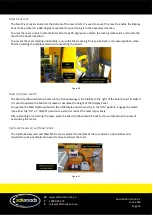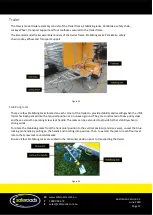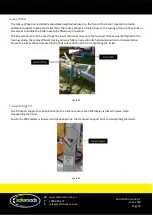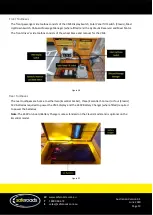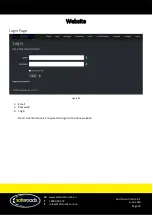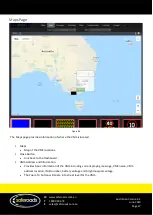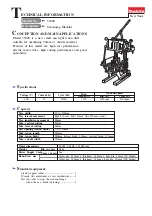
W
www.saferoads.com.au
T
1800 060 672
E
Australian Version 3.1
June 2020
Page 12
Deployment
1.
Park the VMS unit, with the brake lights facing oncoming traffic.
Park on the side of the road on which the VMS unit is to be deployed.
Make sure the trailer is parked securely on a firm, flat surface and is not parked on a slope.
2.
Disconnect trailer from towbar:
a.
Disconnect the safety chain and power cord.
b.
Lift jockey wheel and disconnect the trailer from the towbar.
c.
Lower jockey wheel so trailer is level with the ground.
3.
Lock in handbrake tight and make sure the VMS does not move around.
4.
Put stabiliser arms into place. Extend if possible.
5.
Remove Mast Locking Pin.
6.
Check above, if clear, lift the VMS to head height.
7.
Watch out for toolbox when lifting & lowering mast.
8.
Unlock the Mast Pivot Lock.
9.
Rotate to desired angle, facing the desired traffic. Slight angle is fine.
10.
Check above, if clear, lift fully or as desired.
11.
Place all locks into position, toolboxes, front screen, shaft lock (important).
Pack Up
1.
Lower the mast to head height.
2.
Unlock the Mast Pivot Lock and straighten the VMS.
3.
Lower the display into the transport support beam.
4.
Turn off the VMS unit.
5.
Lock the Mast Pivot Lock.
6.
Return the Mast Locking Pin and secure it.
7.
Return all locks, toolboxes, mast.
8.
Return stabilising jacks and arms into position.
9.
Release handbrake and secure back onto the towbar
10.
Connect the trailer to towbar:
a.
Lift jockey wheel and lower over the tow bar.
b.
Lift jockey wheel to check it is securely in place.
c.
Lock jockey wheel in place.
d.
Connect safety chain.
e.
Connect power cord and check brake lights are working correctly.

















